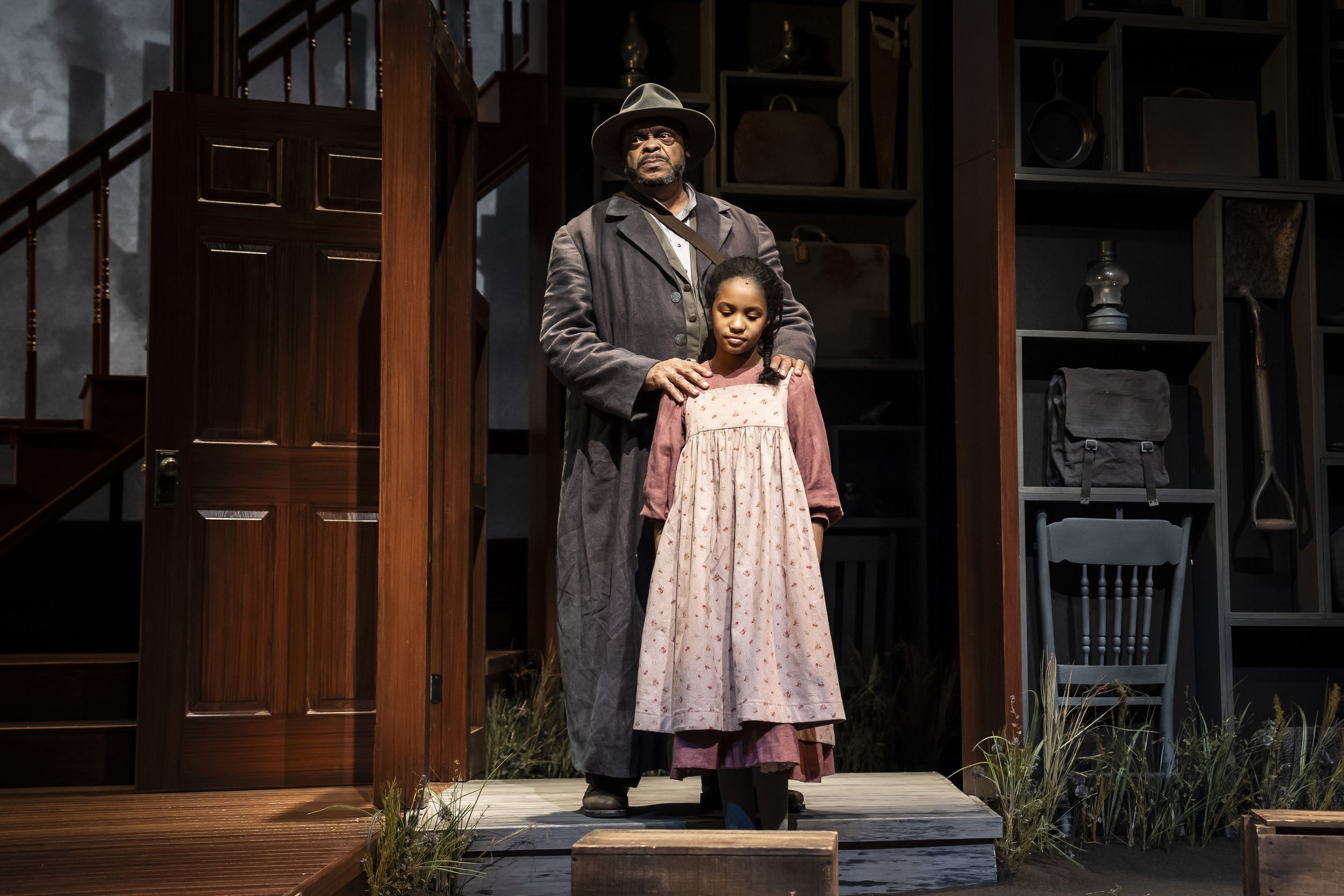Joe Turner’s Come And Gone
It was known as convict leasing. A form of slavery that took place in the United States during the 20th century when Southern states exploited a clause in the 13th Amendment to provide a basis for involuntary servitude, leasing out Black men as prisoners to perform inhumane tasks without payment for minor crimes. The system used Black Codes, or laws specifically for Black people, to criminalize many aspects of everyday life for Black citizens. Pulitzer Prize winner August Wilson's second installment from The Pittsburgh Cycle, a collection of ten plays spanning decades, entitled Joe Turner's Come and Gone, is based on the character of former Tennessee governor Peter Turney's brother, Joe Turney, who illegally enslaved innocent freed blacks for seven years to work on his farm. In the black communities, whenever men went missing, the news would spread that "Joe Turner's come and gone." This phrase was used as a coded way of referring to the practice of kidnapping and selling black men into forced labor, warning people to be cautious and vigilant, especially when noticing suspicious activity. Goodman Theatre has assembled an outstanding team to bring this play to life on its stage, led by the highly regarded and accomplished director Chuck Smith. Smith is widely recognized as one of Chicago's most talented directors, with a keen eye for detail and a deep understanding of the nuances of August Wilson's plays. His intellectual discernment is unparalleled, and he has a unique ability to draw out the best in his cast and crew, creating a genuinely explosive and enthralling theatrical experience. All of August Wilson's plays are must-sees, and Joe Turner's Come and Gone is stunningly captivating, engaging, and mesmerically displays African Americans' skillful and enduring abilities.
“Blacks have traditionally had to operate in a situation where whites have set themselves up as the custodians of the black experience. ”
With that said, the theater scene in Chicago needs help with diversity and inclusion, which has led to limited opportunities for highly talented African-American actors in the city, primarily used as understudies. Despite these challenges, August Wilson's plays have provided a much-needed platform for showcasing the incredible talent of African-American actors in Chicago. The Goodman Theatre, with this production, has made a commendable effort by featuring an all-Chicago cast that includes amazing actors such as A.C.Smith, Dexter Zollicoffer, Sean Blake, Tim Rhoze, Shariba Rivers, Taylar, and a cast of superstars who usually remain unseen. Chicagoland theaters that feature this form of diversity allow audiences to witness the rich intercity cultural heritage while addressing the lack of opportunities for African-American actors in Chicago. We can only pray that other doors open, allowing African Americans a full range of opportunities for positions such as Executive Directors, Artistic Directors, and directors of other multicultural products.
“ They tell me Joe Turner’s come and gone. Ohhh Lordy… Got my man and gone Come with forty links of chain Ohhh Lordy Got my man and gone So sings Wilson’s “root doctor” in the play Joe Turner’s Come and Gone. ”
Joe Turner's Come and Gone is a poignant and thought-provoking play in a boardinghouse of Seth and Bertha Holly in Pittsburgh during 1911. The play explores the complex travels of African Americans as they search for their cultural identity following the horrors of slavery. With spirited characters and outstanding narratives and dialogues, Wilson's story about one's man search, Herald Loomis, a former deacon who lost his song (identity) enslaved by Joe Turner for seven years, searches the earth to find his wife, Martha, with his daughter Zonia. Wilson is a master storyteller, bringing to life the characters' struggles, aspirations, and relationships within his narrative. Seth is the cranky yet humorous owner of the boardinghouse and works as a craftsman, forming pots, dust pans, and other metal objects that he sells to traveling salesman Rutherford Selig, known as the "People Finder." His wife of 25 years is Bertha, a sensible woman who keeps Seth in line, running the boardinghouse and doing all the cooking and cleaning. Bynum Walker, the "conjure man," is also known as the binding man who can bind people together. He lives in the boardinghouse and tells how he came upon his gifts after meeting a mythical angel called the "shiny man." Jeremy Furlow is a high-energy, temperamental young man who works as a laboring man constructing new roads within the city. Jeremy has a combative attitude towards the racial injustice of the law and recently lost his job after refusing to give two dollars to another white worker, causing Seth to lecture him about dealings with white folks. Jeremy is a talented guitarist who often uses his charm to impress women. Among his admirers is Mattie Campbell, who is heartbroken after losing her boyfriend. She seeks Bynum's help to bring back her lover by binding him to her. Mattie believes that she has been cursed because she has lost two children. There's the vivacious, strong, and independent Molly Cunningham and Herald's wife, Martha, who left his home with Herald due to having financial trouble sustaining leaving Zonia and herself, Zonia with her mother, and going north with a traveling church — and my shining stars award goes to the phenomenal performances from child actors Harper Anthony and Kylah Renee Jones as Reuben and Zonia.
A.C. Smith is highly professional, dedicated, and passionate about his craft. His towering frame is reminiscent of the mighty Herald Loomis, whose presence commands attention. Anthony Fleming, Taylar, Nambi E. Kelley, Krystel V. McNeil, Tim Rhoze, Shariba Rivers, and Gary Houston surround this outstanding cast. The play's setting is almost exclusively in the kitchen of the boarding house owned by the son of free parents, Seth Holly. The daily lives of the boarders create a storyline detailing the glaring issues of Black Americans of this era, from the long legacy of slavery to the importance of migration and the preservation of one's identity.
In August Wilson's play, Joe Turner's Come and Gone, identity is a central focus. Throughout the story, each character struggles to define themselves and find their place in society, grappling with questions of race, gender, and profession. August Wilson was a virtuoso at creating works of art that masterfully depicted the realities of the Black human experience in America. His works explored a variety of themes, such as racial injustice, the dispersion of Black people across the world, the challenges and triumphs of migration, and the unforgivable wickedness and audacity of kidnapping and slavery. Through his art, Wilson brought to life the struggles and triumphs of Black people in America, and his works have inspired many. August Wilson's poetic genius within his ten-cycle series, keeping the struggles of African-Americans alive in the souls of humanity, similar to the biblical experience of the tribes of Judah, remembrance of their struggles by gathering twelve stones. Unfortunately, many African Americans haven't heard of or even studied this American phenom, while others seemingly wipe the dust from their feet regarding these issues, which are still prevalent today. Joe Turner's Come and Gone is a two-act play, ending with Loomis freeing himself from the weight of his past, becoming the shiny man, "having found his song, the song of self-fulfillment and joy; however, there are several versions that end with Loomis killing himself in front of everyone after rejecting his Christian faith.
Wilson's play is a powerful exploration of the African American experience and the challenges faced by people of color in the early 20th century. Thanks to theatres worldwide, August Wilson's plays are still circulating, providing a window into a rich and complex cultural history and offering hope and resilience in the face of adversity.
⭐⭐⭐⭐
Theatre Goodman
Joe Turner's Come and Gone
By August Wilson
Directed by Chuck Smith
Playing Now until May 19, 2024
Thanks for visiting Let’s Play. For tickets, click the above logo. For additional reviews, click below.












